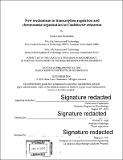New mechanisms in transcription regulation and chromosome organization in Caulobacter crescentus
Author(s)
Haakonsen, Diane Laure
DownloadFull printable version (17.95Mb)
Other Contributors
Massachusetts Institute of Technology. Department of Biology.
Advisor
Michael T. Laub.
Terms of use
Metadata
Show full item recordAbstract
Bacteria use a variety of mechanisms to control transcription in response to environmental cues or growth conditions. Activation or repression of transcription is often carried out by proteins, called transcription factors, that interact with DNA or RNA polymerase (RNAP) or both, and can change the preference of RNAP for target promoters. Additionally, DNA is tightly compacted and organized inside cells. In bacteria, nucleoid-associated proteins (NAPs) play critical roles in shaping and compacting the chromosome by bending, wrapping and bridging the DNA. The binding of these proteins can also profoundly affect gene expression regulation. In this work, I have characterized two DNA-binding proteins from the bacterium Caulobacter crescentus; one transcription factor, GcrA, and one NAP, CnpA. First, I found that GcrA, an essential cell-cycle regulator in Caulobacter, activates transcription by a new mechanism. Unlike most transcription factors that bind to promoters independently of RNAP, GcrA constitutively associates with RNAP via an interaction with Domain 2 of Y70, the primary sigma factor. I showed that GcrA recognizes a subset of methylation sites and can promote binding of RNAP and increase the rate of open complex formation at promoters harboring such sites. Understanding the mechanism by which GcrA activates transcription enabled the identification of its direct regulon and provided important insights into its essential cell-cycle function. For my second project, I identified a new nucleoid-associated protein (NAP), CnpA, in Caulobacter, via mass-spectrometry analysis of its nucleoid content. I showed that CnpA associates with AT-rich DNA but unlike other NAPs, likely does not repress transcription at these loci. We propose a model in which CnpA impacts global supercoiling levels. In sum, these two projects have contributed to expanding our views of how gene expression and chromosome organization are regulated in bacteria.
Description
Thesis: Ph. D., Massachusetts Institute of Technology, Department of Biology, 2016. Cataloged from PDF version of thesis. Includes bibliographical references.
Date issued
2016Department
Massachusetts Institute of Technology. Department of BiologyPublisher
Massachusetts Institute of Technology
Keywords
Biology.